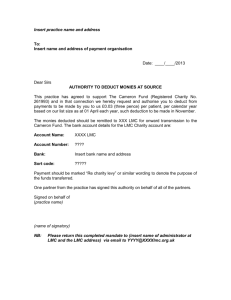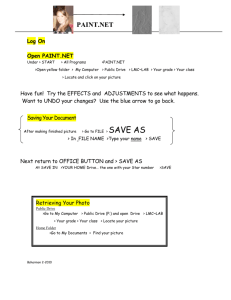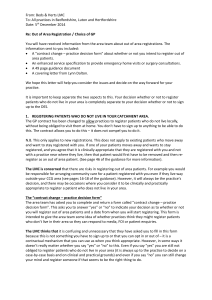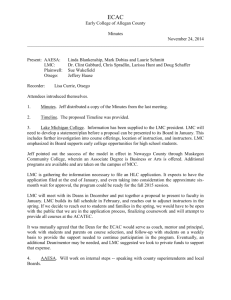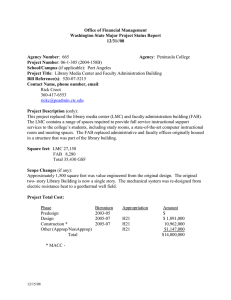Report: Results of the UNAC Labor-Management Committee on Distance Education
advertisement
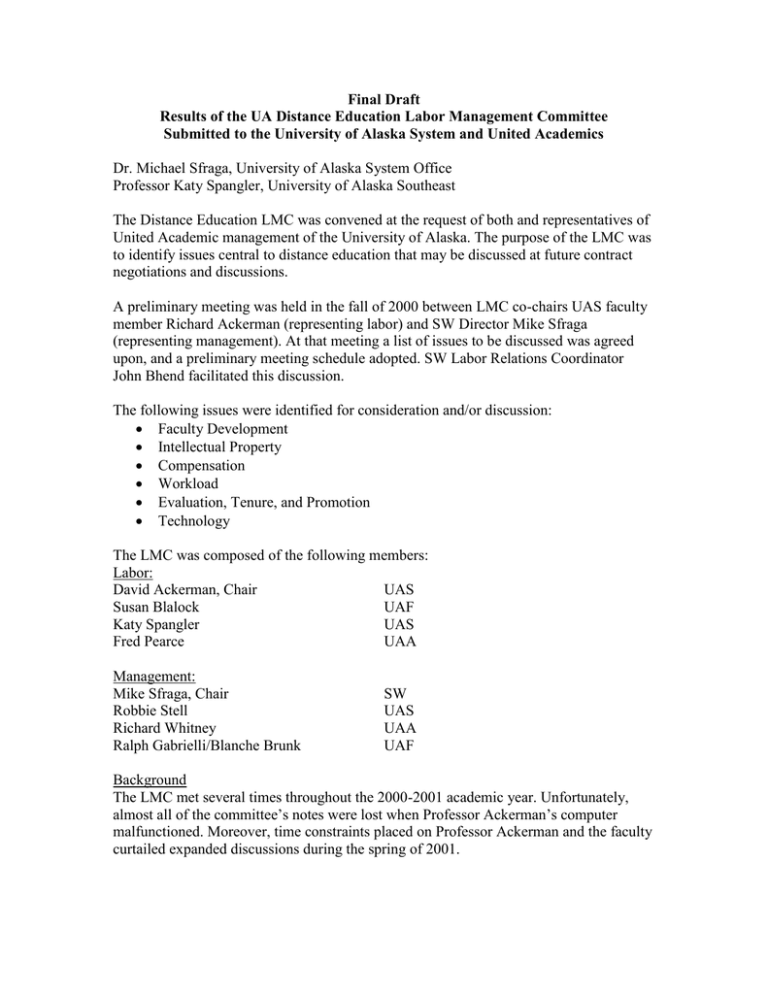
Final Draft Results of the UA Distance Education Labor Management Committee Submitted to the University of Alaska System and United Academics Dr. Michael Sfraga, University of Alaska System Office Professor Katy Spangler, University of Alaska Southeast The Distance Education LMC was convened at the request of both and representatives of United Academic management of the University of Alaska. The purpose of the LMC was to identify issues central to distance education that may be discussed at future contract negotiations and discussions. A preliminary meeting was held in the fall of 2000 between LMC co-chairs UAS faculty member Richard Ackerman (representing labor) and SW Director Mike Sfraga (representing management). At that meeting a list of issues to be discussed was agreed upon, and a preliminary meeting schedule adopted. SW Labor Relations Coordinator John Bhend facilitated this discussion. The following issues were identified for consideration and/or discussion: Faculty Development Intellectual Property Compensation Workload Evaluation, Tenure, and Promotion Technology The LMC was composed of the following members: Labor: David Ackerman, Chair UAS Susan Blalock UAF Katy Spangler UAS Fred Pearce UAA Management: Mike Sfraga, Chair Robbie Stell Richard Whitney Ralph Gabrielli/Blanche Brunk SW UAS UAA UAF Background The LMC met several times throughout the 2000-2001 academic year. Unfortunately, almost all of the committee’s notes were lost when Professor Ackerman’s computer malfunctioned. Moreover, time constraints placed on Professor Ackerman and the faculty curtailed expanded discussions during the spring of 2001. In the fall of 2001 Professor Katy Spangler, UAS assumed Professor Ackerman’s responsibilities. Professor Spangler and Director Sfraga met at a UA Labor Management sponsored training session in an attempt to complete the LMC’s work from the prior academic year. It was agreed upon that Professor Spangler (in consultation with United Academics leadership) would reconstitute the faculty committee, and that the LMC would convene in September of 2001. The co-chairs agreed upon a meeting schedule and agenda items (adopting the items agreed upon in the LMC’s first effort). LMC members approved of both actions. It should be noted that due to the very busy schedules of both faculty and administration, the majority of regularly scheduled meetings occurred from 7:00 – 9:00 a.m. All LMC members should be commended for their commitment to this process. The reconstituted labor committed included: Katy Spangler UAS Daniel Monteith UAS Susan Blalock UAF Bruno Kappes UAA Management: Mike Sfraga, Chair Robbie Stell Richard Whitney Blanche Brunk SW UAS UAA UAF The committee reviewed the work of the previous LMC and agreed to narrow the focus of subsequent dialog to those issues deemed most pressing by the faculty representation. Some of these issues were identified and discussed the previous year, but it was agreed that with a reconstituted LMC, the most effective course of action was to review all previous discussions and issues. The LMC agreed that the task was to identify, define, and discuss issues of concern to UA faculty and administration regarding distance education. There was clear understanding from both sides that the LMC would not be used to negotiate these issues, rather, the LMC would simply identify issues and concerns and transmit such information to both management and labor for future consideration and/or action at the appropriate time. A preliminary Final Report was drafted on April 18, 2002 during a face-to-face meeting at the Anchorage SW Office of Labor Relations. Participants at this meeting included Katy Spangler, Mike Sfraga, Richard Whitney, Susan Blalock, Robbie Stell (via audio conference) and Bruno Kappes. This report constitutes the final version of the April draft and the LMC membership believes that with this report, its work is now complete. The report is divided into two parts. The first part addresses issues of particular concern to the faculty and they believe that the issues found within this section have direct implication for future contract negotiations. The second part addresses items of concern to faculty that they would like to have recorded here – but may not have direct contract implications. Nevertheless, the LMC membership thought it appropriate to list these concerns within this report in hopes that they may be given appropriate attention at the campus, dean, and/or department level. The Distance Education LMC focused its efforts on the following issues: Copyright Intellectual Property Workload Compensation Distance Education in Tenure and Promotion Review Instructional Assessment Faculty Role in Technology Selection and Deployment Copyright Faculty Interest: Faculty want to retain appropriate ownership of their materials, including instructional materials developed for distance education. A review of the current contract outlines the guidelines for copyright of academic and/or research materials including instructional materials. The LMC considered the current contract language and felt that it was appropriate and applicable. However, it was suggested that faculty should engage in specific dialog with their applicable department head, dean, and/or provost prior to the development of specific distance education course materials. The LMC suggested that such dialog include specific agreement on issues related to copyright. In as much as guidance might be needed on this topic, it was suggested that UA General Council be sought by either side for guidance and clarification in such discussions if and when it seems appropriate and applicable. In short, the LMC considered current contract language appropriate yet advised faculty to seek clarification (based on current contract language) regarding the development and future disposition of course-related materials prior to course development or instruction. Faculty Interest: Faculty members would like "quality control" over distance courses and related materials. Some materials developed for distance education may have a long “shelf life,” (CD’s, videotapes, web-based resources) remaining at UA even after a faculty member has either been reassigned or departed. LMC faculty representatives noted faculty interest in “granting” the institution permission to use his/her previously developed materials. Moreover, faculty are concerned that materials developed for UA, to be incorporated within UA courses, may be disseminated or sold by UA to another institution for monetary gain. Faculty would like to have the right to approve or disapprove of having “their” material made available to other entities outside the UA system. The LMC reviewed current contract language and believes that such requests noted above can be addressed within the current contract framework. However, faculty would like to discuss this item at greater length with the appropriate academic leadership at the campus level. Intellectual property Faculty Interest: Faculty want to retain rights to compensation for their work--including distance education materials (web-based materials, CD's, videos, etc) that may have the potential to generate profits if distributed nationally. Faculty representatives noted that this is a major issue across the system regarding material developed for instruction at a distance. After a review of the current contract language, all LMC members agreed that this issue should be considered when faculty are negotiating specific campus-based workload agreements. The faculty noted that such pre-negotiation is imperative. The faculty representatives also noted that the faculty as a whole should understand this and advise faculty to raise this issue during workload agreement discussions. Faculty representatives direct concerned faculty members to the current AAUP Guidelines. Workload Faculty Interest: Faculty believe that there exists inequity in compensation in faculty salaries between those faculty who teach via distance and faculty who teach in a face-toface environment. Faculty representatives forward this issue for consideration to the parallel LMC exploring issues related to faculty workload and compensation. Faculty representatives noted that at a few UA campuses, faculty compensation and issues related to workload are negotiated above and beyond regular workload agreements. Thus, the salary scale for overloads is small when compared to faculty who teach "regular" courses. It should be noted that representatives of UAS underscored the fact that distance education courses (workload) at that campus are incorporated into standard workload agreements. The LMC identified the need for a series of “workshops" focused on educating and assisting faculty in the development of workload agreements. Subsequent discussion among LMC members centered on the content of such workshops and the LMC faculty advised that a wider dialog, facilitated by the leadership of United Academics, would be the most appropriate way to proceed. Moreover, the faculty held that such workshops should also be facilitated and coordinated by representatives of United Academics. Management representatives noted that they would support and assist this system-wide effort. Faculty Interest: Web-based instruction has placed additional demands on faculty across the country that teach in an environment where class size has become an issue. UA faculty are concerned that such realities may present themselves as UA makes available more classes available online. The LMC recommends that the parallel committees investigating issues related to workload/compensation review this issue at greater length. Faculty representatives recommend expanded dialog on faculty support mechanisms such as class caps for online courses, workload adjustments, and the availability of TA’s for online courses. Faculty Interest: A cadre of faculty teach courses that require some face-to-face contact with students. Due to the wide distribution of such students around the state, travel is often required. Such travel place unique demands on faculty time, preparation, and ability to effectively engage students. The LMC believes that such issues could be worked out at the departmental level when negotiating/developing faculty workloads. However, the LMC recommends parallel committees exploring issues related to compensation and workload incorporate this challenging issue within their deliberations. Compensation Faculty Interest: Faculty representatives believe that they are not compensated fairly for developing and teaching courses via distance delivery. There are disparate means among the three MAU’s by which distance courses are selected and taught. At UAF, most distance education courses are facilitated through the Center for Distance Education. Faculty are secured to teach with overload contracts that are above and beyond those workload agreements secured at the department level. Faculty are compensated at different rates (vs. their full time workload/compensation agreements) for such instruction. Faculty representatives also believe that there is little recognition or financial compensation for course development. Faculty believe that release time, negotiated between the department and CDE (in the case of UAF) would place less burden on a faculty member to both develop and subsequently teach courses. Faculty representatives recommend that parallel committees studying compensation and workload further explore this issue. The LMC noted that prenegotiation by faculty with distance education administrators, department heads, and/or deans might prove fruitful. Additional concerns regarding proper technology and faculty development where also identified as issues that should be addressed by parallel committees. Tenure/promotion Faculty Interest: Faculty are concerned that there is less value placed on teaching via distance than there is placed on face-to-face instruction. Subsequently, they believe distance education is not given equal weight in the tenure and promotion process. Faculty representatives believe that this opinion is formed because most distance courses are taught as overloads to their already-set workload. The LMC noted that the UAS handbook specifically includes development and delivery of distance courses/programs in the tenure and promotion process. The LMC also noted that the MAU faculty should drive the tenure and promotion process and changes should be discussed and implemented at the campus level. The LMC recommends that tenure and promotion criteria be reviewed at each campus with specific attention to the value placed on developing and delivering instruction via distance delivery. Course evaluation tools Faculty Interest: Faculty do not believe they are evaluated fairly when teaching a course via distance. Problems with technology (low speed phone lines, system goes down, audio conference interference, etc.) have affected faculty evaluations. These problems are often out of a faculty member’s control – yet are included in the teaching evaluation process. The LMC believes that a review of the current evaluation tool should be undertaken with special attention given to the idea of separating out the evaluation of instruction and the effectiveness/reliability of the technology employed. It should be noted that at UAS, a 10-point questionnaire form was developed for evaluating technology separate from content and instruction. It is given a week prior to faculty evaluations and is available online. Faculty representative on the LMC recommend that campus-based reviews be carried out to consider multiple measures for faculty evaluation: peer reviews and self-evaluations could supplement the IAS forms. They also note that an online version may be more effective. The faculty also noted that University of Washington has three separate forms and suggest that UA faculty leadership work with UW to investigate their separated course evaluation forms. Faculty representatives agreed that this is not a contract issue. The faculty representatives recommend that campus-based faculty drive the first step toward such consideration and discussions should be facilitated by the leadership of United Academics. Faculty input on systematic technology decisions Faculty Interest: Faculty want more input in the decision making process regarding the selection and deployment of instructional technology. Faculty representatives would like to know the mechanisms available to faculty at the campus level to inform technology decisions. The LMC encourages faculty and technology administrators to discuss ways in which faculty can become a part of the decision making process. Moreover, there are a number of system-wide groups that can enable faculty to become a part of the process including SAC, the Information Technology Council (facilitated by Steve Smith), the Distance Education Council (facilitated by Mike Sfraga), and Curriculum Planning Team (recently established by SAC and facilitated by Mike Sfraga). Faculty also note that the Senates at each MAU can and should play a role in this process. The following items were not identified as issues necessarily related to contract negotiations or impacted by the current union contract. However, the faculty felt very strongly that such issues should be addressed, however briefly, within the LMC. Financial administration of inter-MAU projects. Faculty Interest: Faculty and administration need simple ways to share information and resources related to inter-MAU grants and projects. A perception existed that an efficient method of administering finances for inter-MAU projects did not exit. UA distance education faculty were concerned about moving money between MAU’s to support travel, instruction, and related meetings. Administration representatives described the current capacity of the Banner system and the processes already in place to address the needs identified by LMC faculty representatives. It was agreed that the current capacity within Banner is sufficient to handle the identified needs. However, faculty will need to work closer with academic department staff to understand the current processes and procedures so that faculty are not burdened with the responsibility to create additional administrative processes. Best practices regarding information technology (faculty development) Faculty Interest: All members of the LMC desire quality development opportunities for faculty who are creating and delivering distance courses. The LMC recommends that existing faculty development programs and efforts currently in place at each MAU be coordinated so that UA faculty have the benefit of system-wide expertise. Moreover, faculty should consider the creation of specific programs targeted toward distance education. LMC representatives suggest SAC consider such an effort and look to the leadership of the existing CPT to help define focus, content, and faculty who posses the skills necessary to carry out such an effort. . Faculty Interest: Faculty representative noted that faculty do not want to be forced to consult with MAU IT staff for assistance in course development and delivery. They much prefer to work with other faculty. No recommendations were made on this item and it was suggested that LMC faculty representatives raise this issue at their home MAU with the appropriate academic leadership. Role of curriculum review in terms of distance education Faculty Interest: Faculty and administration want to assure that distance courses have the same integrity and status as those taught in a traditional mode of delivery. Faculty noted that mechanisms for curriculum review are already in place at each campus. There exist disparate processes throughout the UA system for the review of distance education courses. LMC faculty noted that when distance courses are reviewed along with "regular" classes, the value of distance education is highlighted. It was brought to the attention of the LMC that at UAA an existing course that is proposed to be taught via distance is review a second time by the CAS. UAA faculty feel that such “over review” detracts from the value and perception of distance education. In contrast, it was noted that at UAS a distance course with the same name/number as a campus-based course is viewed as the same course – with no additional review necessary. Scheduling of distance education courses. Faculty Interest: Faculty expressed concern that instructional technology departments (UAA Academic Technology Services, UAF Center for Distance Education) schedule courses as opposed to academic departments. However, it was also noted that many departments do in fact schedule courses and this process/decision is a campus-based preference. Portals to Internet sites Faculty Interest: Faculty and administrators felt very strongly that students need a clear and seamless "portal" to information related to UA-wide distance education course offerings. Administration representatives described the recently released (2001) UA Distance Education Gateway that unifies all UA distance education courses within one online database (Distance.Alaska.edu or at Online.Alaska.edu). The administration also noted that the website allows students to select a campus preference, a program preference, a delivery preference, etc. LMC members expressed an interest in an overall UA portal that allows for the free access to all UA information while maintaining links to the separate campuses. Summary With the submission of this report to both labor and management, LMC members consider this final document to mark the last action of the committee. All would like to underscore the collegial atmosphere and, albeit spirited at times, open exchange of philosophies, positions, and opinions. Members of the LMC trust that by addressing issues related to distance education within this framework, both parties will have additional and helpful information available to them for future discussions.
